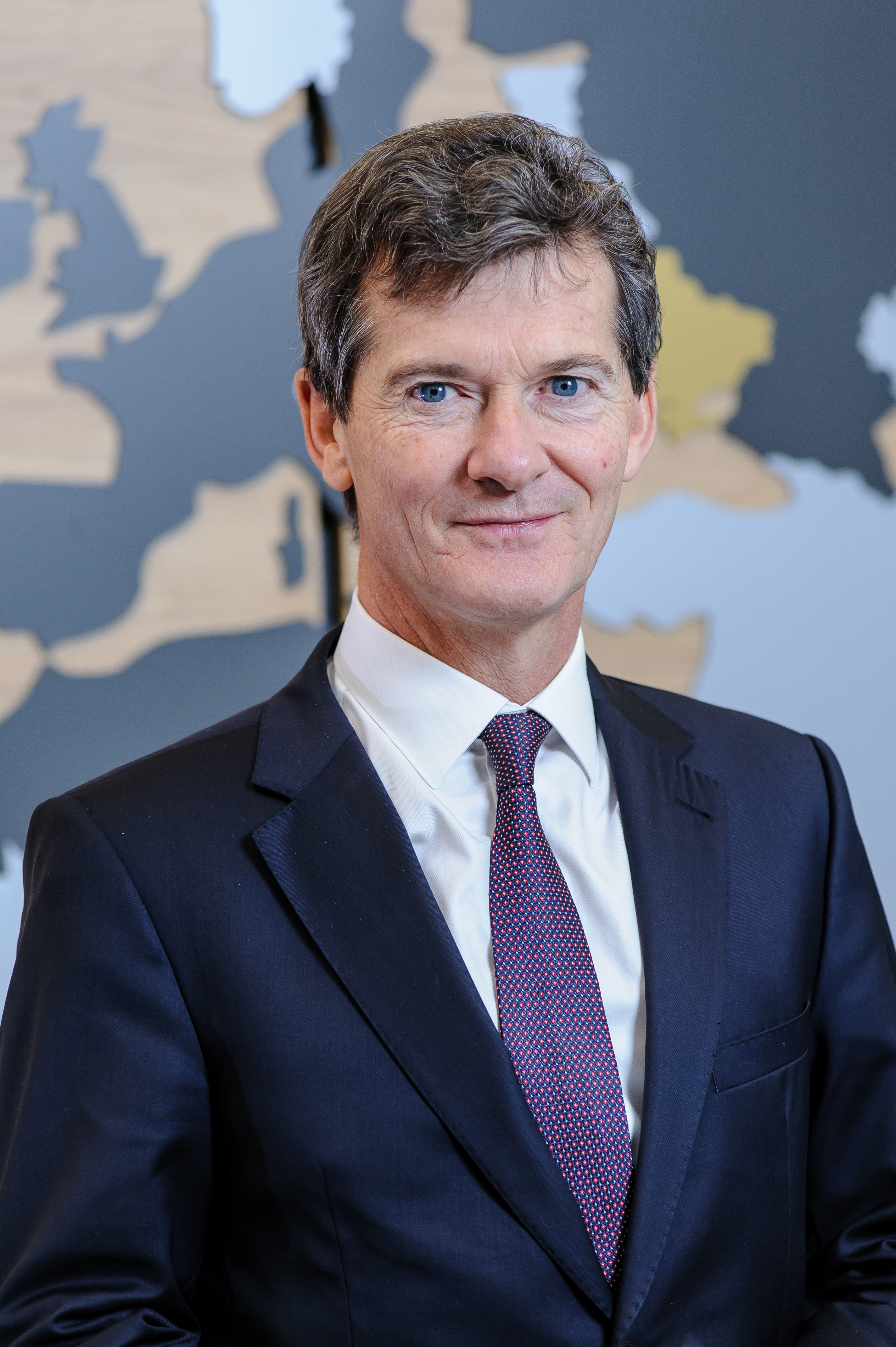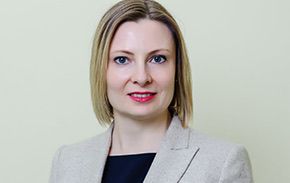FinClub, December 2022
 - Carlos, you came to Ukraine in early 2020 prior to the COVID19 pandemic. In 2022, full-scale war broke out here. Did you find yourself wishing for transfer to a safer country?
- Carlos, you came to Ukraine in early 2020 prior to the COVID19 pandemic. In 2022, full-scale war broke out here. Did you find yourself wishing for transfer to a safer country?
- As of now, I am not planning to leave my role. On the one hand, I find it really challenging, on the other – I am eager to be with Ukrainians in this period, see how they react to the events, how their attitude to this situation changes and, finally, how they keep up the diligent work regardless of the circumstances. I keep wondering how the French or other Western Europeans would respond to similar events and how they would behave. I feel they would not be so positive and active.
- The majority of the Management Board Members are expats. How do you coordinate work? How often do they come to Ukraine?
- We work on flexible mode, trying to maintain at least one expat from the Management Board present in Ukraine at all times. As soon as there is a possibility and permission from the Group, we come to Ukraine. In September, before the mass airstrikes on Ukraine started, the entire Management Board was present here. I worked in Kyiv even on October 10, when there were explosions downtown.
- Based on your feelings and observations, how has Ukrainian banking system at large and Credit Agricole Ukraine in particular been coping with all the tribulations since the full-scale invasion began?
- Despite all events of the war, the banking system has remained stable and strong all this time. The banking system has maintained a rather high level of liquidity. I believe the National bank has taken the right measures at the right time and that is why the banking system has endured and kept up the stable operation. It is clear, however, that the situation in banking is fairly complicated, we are allocating a large share of our revenue for provisioning in case of unforeseen situations. We closely follow the developments, especially on the occupied territories and try to address them promptly.
- What did you as CEO find the hardest since the beginning of the full-scale invasion?
- February 24 was definitely the hardest, when we realized that none of our scenarios would come to be. To say it was a shock is to say nothing. Everyone, including us had to approve numerous hard decisions simultaneously: first and foremost, we had to ensure safety of our employees, secondly we had to ensure stability of our IT systems as the work of the bank itself depends on it. Moreover, we had to provide daily banking service non-stop, provide customer service even in the hardest conditions all over Ukraine and all around the globe. Working remotely was something that had been tried and tested during the Covid Crisis as well as our systems. Therefore, the bank operations remained uninterrupted. These skills helped us stand strong.
- Did your shareholders wish to minimize operations in Ukraine after February 24 in order to wait out the war with the lowest losses possible?
- No, on the contrary – since the first days and minutes of war we received an outpour of overwhelming support from our parent bank as well as from other banks of the Group all over the world. The group has immediately released its official statement that they guarantee their full support to colleagues in Ukraine: in this period there have not been any lay-offs or pay cuts, quite the opposite – salary was raised in October. During the first weeks, we reviewed our strategy with our shareholders and approved two important decisions. First – we decided to continue supporting the agrarian business in Ukraine, as it is an essential element both for Ukrainian economy and for Credit Agricole Ukraine. We are active participants in the “Affordable loans 5-7-9%” state program under which we have issued UAH 1.2 billion of loans to finance the agrarian companies since the beginning of war. Besides, during the war we joined the Government program of state guarantees, under which we have already issued about UAH 700 million worth of loans. The second decision involved automotive lending – prior to the war, we were among market leaders of this segment and so we decided to continue supporting our customers in these trying times. Moreover, we analyzed our loan portfolio as a whole and for each corporate customer in particular: some have maintained nearly pre-war levels of production, others experience difficulties caused by the war, and also there were some who practically ceased operations but eventually were able to resume their activity. Our corporate business team has accomplished enormous task, which enabled us to further build relation of partnership with our customers.
- What changes has your loan portfolio structure undergone since the start of the war?
- Changes fully reflect those in economy of Ukraine as a whole. Demand for financing on the part of our agrarian customers has gone up and over 50% of our loan portfolio is comprised of financing the agrarian sector and food processing. Speaking of international business and transnational corporates we worked with in Ukraine, their needs in working capital have declined. Private individuals loan portfolio was reduced by about 20%. However, we have already resumed automotive lending and issued over 200 million in car loans, so we are expecting to somewhat grow our portfolio in this year.
- In your opinion, does Credit Agricole Ukraine manage to promptly address the challenges of today, when working conditions change practically on the daily?
- With the beginning of the war, we approved a number of decisions that enabled us to promptly respond to the events. For instance, we decentralized responsibilities when approving decisions, since it is not right for us to give orders from Kyiv and even less so from Paris on how a bank should function in a certain location. Talking about operation of our branches, head of a branch is the person able to make the most effective decision. This person is always on site, can see the situation and can make a decision on whether it is safe to open a branch at a certain moment. Additionally, we began preparations for the potential power outages well in advance: created a reserve data center, which we then moved to cloud. If we lose access to our physical data center, we will have the option to operate our IT system environment. This solution will help us prepare for the situation when there is no power supply at all.
- How has approach to planning evolved in your bank? Is any planning even possible in the wartime?
- One can plan, however the process has certainly become more complicated. A year ago, we approved the new strategy for Credit Agricole Ukraine, which we are trying to implement even in the context of war. However, at present we focus our attention on optimization processes, launch of new digital solutions in order to achieve the maximum possible level of customer service convenience and safety. Recently we launched a new internet-bank for business,and CA+ Pro for private entrepreneurs, which combine innovative solutions and best practices of the international Group. Our goal is to prepare the bank for the end of the war so that we are able to continue our operations in Ukraine with renewed vigour. In my opinion, after the war is over, many various projects for the country’s post-war recovery will emerge, investments will grow, assistance from partners and donors will be available. And we will definitely include this aspect in our strategy. I really wish it all happened as soon as possible.
- Your bank has always focused on social projects. How has their role changed this year?
- In the first days of the war, Crédit Agricole Group started the emergency solidarity fund of €10 million. Half of these funds is allocated to aid the bank employees in Ukraine, the rest is for the non-governmental organizations that further redistribute the funds on site and provide targeted assistance to those in need. Also, there was a multitude of initiatives from other banks of the Group in different countries. For instance, France has collected a sizeable package of humanitarian aid for Ukraine, while our colleagues in Taiwan issued green solidarity bonds, and part of the revenue from those was channeled to support Ukrainians with assistance of UNICEF. As of now, this product is one of a kind in the world and these bonds are in high demand in Taiwan.
In 8 months, Credit Agricole Bank Ukraine channeled nearly UAH 20 million to various charitable projects, mostly for the procurement of essential medical equipment for hospitals with the assistance of Your Support charitable fund. To name a few, we supported Zaporizhzhia Regional Clinical Children’s Hospital and the Institute of Pediatrics, Obstetrics and Gynecology.
- What opportunities do you envision for Ukraine in general and banking market in particular now that Ukraine has become the EU candidate?
- I think this is an extraordinary development for Ukraine. I used to work in Serbia and was able to observe the process of the country applying for EU membership from within. I watched the transformations in the country and in the banking sector in particular. It was a lasting process but I think everything will happen a lot faster for Ukraine, as the political will is present.
- The very fact that Ukraine has obtained the EU candidate status is an enormous green flag for investors even if the process could last several years. In the process of adopting European standards, the trust from investors will be growing. Which is crucial.

 Useful information
Useful information
 Useful information
Useful information
 Useful information
Useful information
 Useful information
Useful information
 Useful information
Useful information
 Useful information
Useful information
 Useful information
Useful information
 Useful information
Useful information
 Useful information
Useful information
 Useful information
Useful information
 Useful information
Useful information
 Useful information
Useful information
 Useful information
Useful information
 Useful information
Useful information
 Useful information
Useful information

 - Carlos, you came to Ukraine in early 2020 prior to the COVID19 pandemic. In 2022, full-scale war broke out here. Did you find yourself wishing for transfer to a safer country?
- Carlos, you came to Ukraine in early 2020 prior to the COVID19 pandemic. In 2022, full-scale war broke out here. Did you find yourself wishing for transfer to a safer country? 




